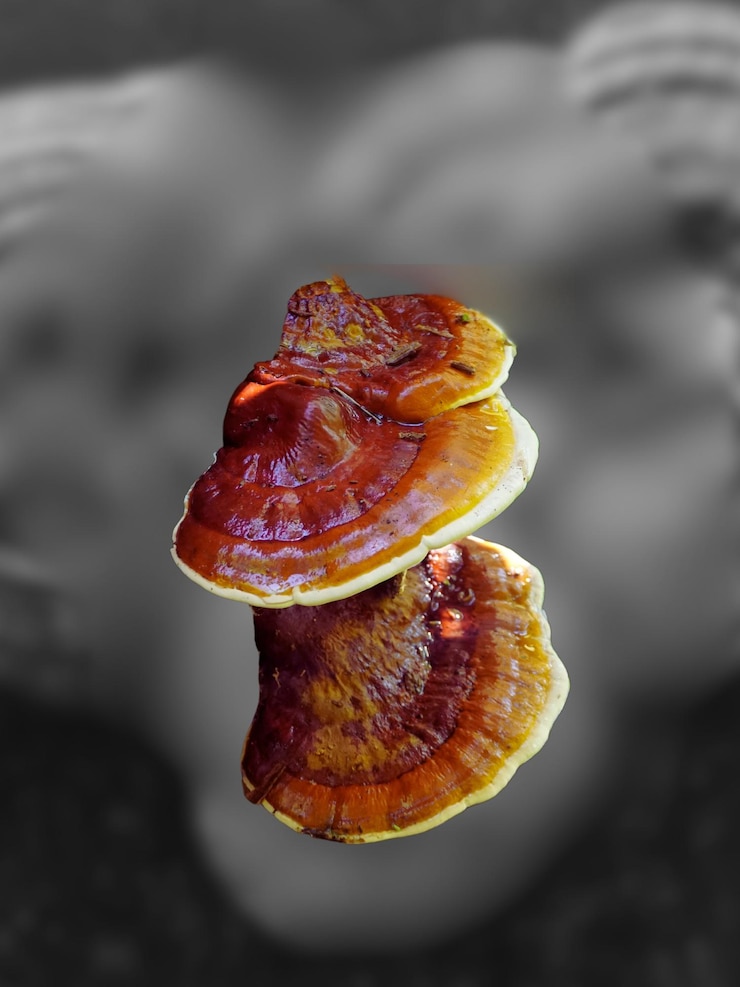Trouble Falling Asleep? Why It Happens and How Natural Solutions Can Help
Trouble Falling Asleep? Why It Happens and How Natural Solutions (Like Reishi) Can Help
Find it hard to fall asleep? Explore the common causes of sleep onset insomnia and discover effective natural remedies, including sleep hygiene and Reishi mushroom, to help you drift off peacefully. Learn more at ReishiTherapy.com.

The clock ticks relentlessly. You've tossed, turned, and tried every comfortable position imaginable, yet sleep remains frustratingly elusive. Your body feels tired, but your mind races, replaying the day's events or worrying about tomorrow. If this scenario sounds familiar, you're certainly not alone. Difficulty falling asleep, known clinically as sleep onset insomnia, is an incredibly common struggle in our fast-paced modern world. While occasional trouble drifting off is normal, persistent difficulty can significantly impact your energy, mood, and overall well-being. The good news is that it's often treatable. Understanding the common reasons behind why you can't fall asleep is the first step towards finding effective, natural strategies – encompassing lifestyle adjustments and supportive remedies like the time-honored Reishi mushroom – to help you finally achieve the peaceful transition to sleep you deserve, aligning perfectly with ReishiTherapy.com's commitment to science-backed natural wellness.
What Happens When You Can't Switch Off?
Sleep onset insomnia specifically refers to the persistent difficulty in initiating sleep, typically defined as taking longer than 20-30 minutes to fall asleep after getting into bed [Source: Mayo Clinic]. For many, it feels like an inability to 'switch off' the brain. Normally, falling asleep involves a complex interplay of factors orchestrated by our internal biological clock, or circadian rhythm. As evening approaches, our bodies naturally start producing melatonin, a hormone that signals it's time to wind down. Body temperature slightly drops, and brain activity begins to shift towards slower, more relaxed patterns, easing us into the first stage of sleep. However, when this delicate process is disrupted, the door to sleep remains stubbornly closed. While a few nights of difficulty might be triggered by temporary stress (acute insomnia), when the problem persists for three months or more, it's considered chronic insomnia. The consequences extend beyond just feeling tired; chronic sleep onset issues can lead to significant daytime fatigue, irritability, difficulty concentrating, impaired memory, and even an increased risk of accidents [Source: Mayo Clinic]. Recognizing these impacts underscores the importance of addressing the root causes.
Unmasking the Reasons for Your Restless Nights
Why does your brain refuse to quiet down when you're longing for rest? Numerous factors can contribute to sleep onset insomnia, often working in combination. Understanding these potential culprits is key to finding the right solutions.
- Stress and Anxiety: This is perhaps the most common trigger. Worries about work, finances, relationships, health, or significant life events can keep your mind in an activated state, making relaxation impossible. The physiological stress response itself, involving hormones like cortisol, is counterproductive to sleep initiation.
- Lifestyle Factors: Our daily habits play a huge role. Irregular sleep schedules, such as those caused by shift work or frequent travel (jet lag), confuse our internal clock. Poor 'sleep hygiene' habits are also major contributors; these include inconsistent bedtimes and wake times, taking long or late-afternoon naps, engaging in stimulating activities before bed, using screens (phones, tablets, computers) emitting blue light close to bedtime, and having an uncomfortable or non-conducive sleep environment (too bright, noisy, or warm).
- Dietary Choices: What and when you eat and drink matters. Consuming large meals close to bedtime can cause physical discomfort or indigestion. Stimulants like caffeine found in coffee, tea, soda, and even chocolate, especially when consumed in the afternoon or evening, can significantly delay sleep onset. Nicotine is another potent stimulant. While alcohol might initially make you feel drowsy, it disrupts the later, more restorative stages of sleep and often leads to nighttime awakenings [Source: Mayo Clinic].
- Underlying Conditions: Sometimes, difficulty falling asleep is a symptom of another issue. Mental health conditions like anxiety disorders and depression are strongly linked to insomnia. Various medical conditions involving chronic pain (like arthritis), respiratory problems (like asthma), gastroesophageal reflux disease (GERD), restless legs syndrome (RLS), or hormonal imbalances can also interfere with falling asleep comfortably [Source: Mayo Clinic].
- Medications: Certain prescription and over-the-counter medications, including some antidepressants, blood pressure medications, decongestants, and weight-loss products containing stimulants, can have insomnia as a side effect.
Identifying which of these factors might be playing a role in your specific situation is a crucial step towards finding relief.

Finding Calm: Natural Strategies to Invite Sleep
Fortunately, many effective strategies exist to combat sleep onset insomnia naturally, focusing on calming the mind and preparing the body for rest. Combining behavioral approaches with supportive natural remedies can create a powerful synergy.
Mind-Body Techniques:
- Mindfulness Meditation & Deep Breathing: Regularly practicing mindfulness, even for just 10-15 minutes daily, can significantly calm a racing mind. Techniques involve focusing on your breath and observing thoughts without judgment. Studies have shown meditation improves insomnia symptoms and overall sleep patterns [Source: Healthline]. Deep, slow breathing exercises can also activate the body's relaxation response.
- Relaxation Techniques: Progressive Muscle Relaxation (PMR), which involves systematically tensing and releasing different muscle groups, can effectively reduce physical tension that might be keeping you awake.
- Gentle Yoga or Stretching: Engaging in slow, mindful movement through styles like Yin or restorative yoga before bed can alleviate stress and improve physical comfort, promoting relaxation conducive to sleep [Source: Healthline].
Herbal & Supplemental Support:
- Reishi Mushroom (Ganoderma lucidum): This adaptogenic mushroom holds a revered place in Traditional Chinese Medicine for its calming properties. Modern research is beginning to illuminate how it might specifically help with falling asleep. Studies, primarily in animals thus far, indicate that Reishi extracts can significantly shorten sleep latency – the time it takes to fall asleep [Source: Yao et al., Sci Rep 2021]. The mechanisms appear multifaceted; research suggests Reishi may influence the serotonin pathway (serotonin being a precursor to the sleep hormone melatonin) and exert its effects partly through the fascinating gut-brain axis. One compelling study found Reishi's sleep-promoting benefits in mice were dependent on a healthy gut microbiome [Source: Yao et al., Sci Rep 2021]. Its adaptogenic nature may also help modulate the body's stress response, further aiding relaxation.
- Other Natural Aids: Several other natural compounds are popular for sleep support. Magnesium plays a role in muscle relaxation and stress relief [Source: Healthline]. Lavender, often used in aromatherapy or taken orally, is known for its calming effects [Source: Healthline]. Chamomile tea is a traditional, gentle remedy often used to promote relaxation before bed.
Exploring these natural avenues, particularly focusing on consistency and finding what resonates with your body, can make a significant difference.


Your Wind-Down Ritual: Paving the Way for Sleep
Beyond specific remedies, establishing a consistent and relaxing pre-sleep routine is one of the most powerful tools against sleep onset insomnia. This ritual signals to your brain and body that it's time to transition from the activity of the day to the restfulness of the night.
Consistency is Crucial: Aim to go to bed and wake up around the same time every day, even on weekends, as much as possible. This helps regulate your body's natural sleep-wake cycle [Source: Mayo Clinic].
The Golden Hour Before Bed: Treat the last 60 minutes before your intended bedtime as sacred wind-down time.
- Dim the Lights: Lowering the lights helps stimulate melatonin production.
- Power Down Screens: The blue light emitted from phones, tablets, computers, and TVs suppresses melatonin and keeps the brain alert. Avoid them entirely during this hour.
- Engage in Calm Activities: Choose activities that you find genuinely relaxing. This could include taking a warm bath (the subsequent drop in body temperature can promote sleepiness), reading a physical book under soft light, listening to calming music or a podcast, gentle stretching, or journaling to offload thoughts and worries.
- Avoid Stimulation: Steer clear of stressful conversations, intense work tasks, or overly engaging entertainment.
Optimize Your Sleep Sanctuary: Ensure your bedroom is conducive to sleep – ideally dark, quiet, and cool. Use blackout curtains, earplugs, or a white noise machine if needed.
Watch What You Consume: As mentioned earlier, avoid heavy meals, caffeine, and alcohol in the hours leading up to bed. If you're hungry, a light, sleep-friendly snack (like a small banana or a few almonds) might be okay, but listen to your body.
Creating and sticking to a personalized wind-down routine takes effort initially, but the payoff in terms of easier sleep onset can be substantial.

Lying awake night after night is undeniably frustrating, but understanding that trouble falling asleep often stems from identifiable and modifiable factors is empowering. Stress, disruptive habits, and even dietary choices can significantly interfere with our natural ability to drift off. By consciously implementing natural strategies – establishing consistent sleep hygiene, creating a dedicated wind-down routine, practicing relaxation techniques like mindfulness, and exploring supportive natural remedies such as the scientifically intriguing Reishi mushroom – you can actively work towards calming your mind and body, inviting sleep more readily. Be patient with yourself; finding the right combination of strategies may take time and experimentation, but reclaiming peaceful nights is achievable. Struggling to quiet your mind at night? Explore how ReishiTherapy's natural formulations [Placeholder: Link to ReishiTherapy Product Page (relevant sleep product)] might support your wind-down routine, or take our personalized Sleep Quiz [Placeholder: Link to ReishiTherapy Sleep Quiz] to discover more tailored insights.
References:
- Mayo Clinic. Insomnia - Symptoms and causes. https://www.mayoclinic.org/diseases-conditions/insomnia/symptoms-causes/syc-20355167
- Yao, C., Wang, Z., Jiang, H. et al. Ganoderma lucidum promotes sleep through a gut microbiota-dependent and serotonin-involved pathway in mice. Sci Rep 11, 13660 (2021) . https://www.nature.com/articles/s41598-021-92913-6
- (Optional: Healthline. 8 Insomnia Home Remedies: Exercises, Oils, and More. [Link if desired])


